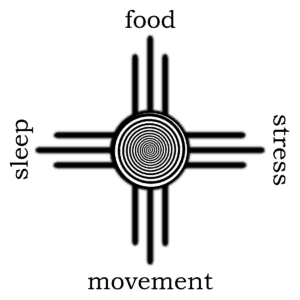Vital[ist] Lifestyle Interventions
We practice and teach Traditional Western Herbalism in the vitalist tradition. We believe that the strongest factor in healing is the body’s own spirit or vital force, and that if the spirit is well cared for and nourished, all illness and injury can be overcome from within.
This means much of our work is focused on the foods people eat, their exercise habits, the quantity and quality of sleep they get, and the physical and psychological stresses they encounter in their daily lives. We use nutrition, primal movement, stress reduction strategies, and gradual lifestyle changes to help them come into a place of balance and whole health.

These fundamental determinants of health are our primary angles of intervention in any therapeutic program.
Nutritional powerhouses though they are, no herb or blend alone will be enough to compensate for a diet that isn’t nourishing, or is actively destructive to health. We focus on identifying food allergies and sensitivities in our clients, and guide them through the transition to an allergen-free diet. This goes along naturally with a diet made up of high quality whole foods, as processed and prepared ‘food products’ are almost universally made with the major allergens wheat, dairy, soy, or corn — and even if not, they usually contain devitalized ingredients such as rancid seed oils. The inclusion of healthy animal meats and fats, bone broths, many-colored vegetables, and seaweeds in a grain-free, relatively low-carb diet are our other baseline nutritional recommendations.
Movement is as much a component of whole health as is diet. The sedentary habits of modern people have been associated with much discomfort and disease, but even some of the most common recommendations for “exercise” are now being reconsidered. When we talk about movement, we mean consistent, low-level activity like walking, hiking, standing, and stretching throughout the day. Occasional short-duration, high-intensity workouts of heavy lifting or sprinting exercises are also very helpful. This is always scalable to the needs, desires, and abilities of the individual: changing to a standing workstation and walking thirty minutes a day will be enough for some, while others will want to include field sports, yoga, martial arts, or dance.
Any exercise will aid in stress reduction, another major component of our approach to healing. Stress comes in many forms, but there is a lot we can do to lessen it, no matter the source. Getting enough sleep is key; managing exposure to sunlight and darkness is very important in reestablishing natural circadian rhythms. Meditation practices and breathwork are helpful in dealing with acute stresses, and spending time in nature — ‘forest bathing’, it’s sometimes called — is a powerful balancer to the tensions induced by living in a wholly human-built environment.
The common link to all these approaches is the primal lifestyle of the human species. Humans lived as hunter-gatherers for two million years or more, and major changes happened only in relatively recent times. Today’s office-drone, who sits in a box for eight hours a day, then drives home in a box to watch “reality” on a box and eat food from a box, cooked in a box — his life is different in nearly all respects from the hunter-gatherer of old. And yet evolution moves slowly, and his body is still built in such a way that he is most healthy when he lives, moves, and eats the way his ancestors did. The spirit is stifled in boxes. That spirit, the ‘vital force’ that gives name to vitalism, flows freely to the degree that life is lived in a manner that mirrors the conditions in which humankind evolved and grew to strength.
This doesn’t mean we must flee the cities and forage all our food to be healthy. But it does mean that some lifestyle changes are in order. It seems to work best when these are undertaken gradually, a little at a time, so that new habits take solid root and are not easily shaken by stress or circumstance. And in those transitions, sometimes you need help — that is the time for medicinal herbs, as supports and catalysts for these lifestyle changes which are the true foundation of healing.
We call ourselves herbalists, and herbs are among our most powerful tools to effect change, but we believe you shouldn’t need to take any medicine forever — even natural medicines.
Most illnesses today, we find, are rooted in deficiency and malnutrition, and a great many of the herbs we use are chosen for their capacity to provide physical or energetic nourishment. We often say something like: “this nettle we’re giving you isn’t ‘medicine’; you were nettle-deficient!”
So while we may suggest tonic herbal preparations to aid in reaching nutritive goals, compensate for personal weak points, or prevent illness in season, the idea is always to get to a place where no medicine is needed to be able to get through the day: that is a definition of health.

Join our newsletter for more herby goodness!
Get our newsletter delivered right to your inbox. You'll be first to hear about free mini-courses, podcast episodes, and other goodies about holistic herbalism.
